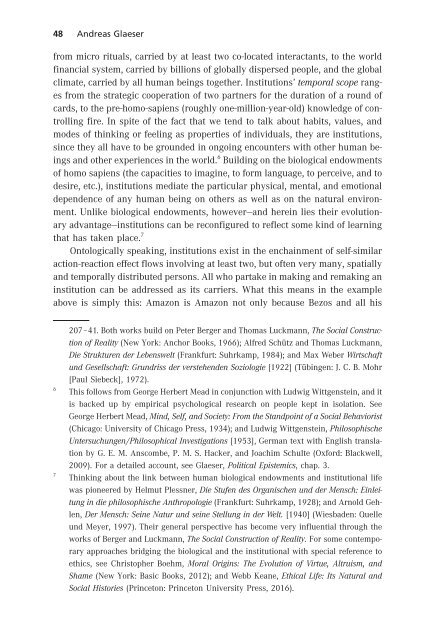Piet Naudé | Michael Welker | John Witte, Jr. (Eds.): The Impact of Political Economy (Leseprobe)
In our late modern pluralistic societies, there are tensions and complementarities between a plurality of individual and social claims and activities to shape societal life and a constructive pluralism of what is known as social systems. The latter provide normative codes and powers emanating from the areas of law, religion, the family, the market, the media, education, academic research, health care, defense and politics. A better understanding and steering of this complex division of powers is crucial for the common good and for freedom and peace. In this volume, a multi-disciplinary team of experts from Germany, Italy, Australia, the UK, the USA, and South Africa bring their conceptual, empirical and historical insights to bear in three broad sections: »The moral dimension of social systems«; »The interaction of religion, law and education with political systems«; and »The moral (mal)-formation evident in case studies on the global financial crisis and social media«.
In our late modern pluralistic societies, there are tensions and complementarities between a plurality of individual and social claims and activities to shape societal life and a constructive pluralism of what is known as social systems. The latter provide normative codes and powers emanating from the areas of law, religion, the family, the market, the media, education, academic research, health care, defense and politics. A better understanding and steering of this complex division of powers is crucial for the common good and for freedom and peace.
In this volume, a multi-disciplinary team of experts from Germany, Italy, Australia, the UK, the USA, and South Africa bring their conceptual, empirical and historical insights to bear in three broad sections: »The moral dimension of social systems«; »The interaction of religion, law and education with political systems«; and »The moral (mal)-formation evident in case studies on the global financial crisis and social media«.
You also want an ePaper? Increase the reach of your titles
YUMPU automatically turns print PDFs into web optimized ePapers that Google loves.
48 Andreas Glaeser<br />
from micro rituals, carried by at least two co-located interactants, to the world<br />
financial system, carried by billions <strong>of</strong> globally dispersed people, and the global<br />
climate, carried by all human beings together. Institutions’ temporal scope ranges<br />
from the strategic cooperation <strong>of</strong> two partners for the duration <strong>of</strong> around <strong>of</strong><br />
cards, to the pre-homo-sapiens (roughly one-million-year-old) knowledge <strong>of</strong> controlling<br />
fire. In spite <strong>of</strong> the fact that we tend to talk about habits, values, and<br />
modes <strong>of</strong> thinking or feeling as properties <strong>of</strong> individuals, they are institutions,<br />
since they all have to be grounded in ongoing encounters with other human beings<br />
and other experiences in the world. 6 Building on the biological endowments<br />
<strong>of</strong> homo sapiens (the capacities to imagine, to form language, to perceive, and to<br />
desire, etc.), institutions mediate the particular physical, mental, and emotional<br />
dependence <strong>of</strong>any human being onothers as well as on the natural environment.<br />
Unlike biological endowments, however—and herein lies their evolutionary<br />
advantage—institutions can be reconfigured to reflect some kind <strong>of</strong> learning<br />
that has taken place. 7<br />
Ontologically speaking, institutions exist in the enchainment <strong>of</strong> self-similar<br />
action-reaction effect flows involving at least two, but <strong>of</strong>ten very many, spatially<br />
and temporally distributed persons. All who partake in making and remaking an<br />
institution can be addressed as its carriers. What this means in the example<br />
above is simply this: Amazon is Amazon not only because Bezos and all his<br />
6<br />
7<br />
207–41. Both works build on Peter Berger and Thomas Luckmann, <strong>The</strong> Social Construction<br />
<strong>of</strong> Reality (New York: Anchor Books, 1966); Alfred Schütz and Thomas Luckmann,<br />
Die Strukturen der Lebenswelt (Frankfurt: Suhrkamp, 1984); and Max Weber Wirtschaft<br />
und Gesellschaft: Grundriss der verstehenden Soziologie [1922] (Tübingen: J. C. B. Mohr<br />
[Paul Siebeck], 1972).<br />
This follows from George Herbert Mead in conjunction with Ludwig Wittgenstein, and it<br />
is backed up by empirical psychological research on people kept in isolation. See<br />
George Herbert Mead, Mind, Self, and Society: From the Standpoint <strong>of</strong> aSocial Behaviorist<br />
(Chicago: University <strong>of</strong> Chicago Press, 1934); and Ludwig Wittgenstein, Philosophische<br />
Untersuchungen/Philosophical Investigations [1953], German text with English translation<br />
by G. E. M. Anscombe, P. M. S. Hacker, and Joachim Schulte (Oxford: Blackwell,<br />
2009). For adetailed account, see Glaeser, <strong>Political</strong> Epistemics, chap. 3.<br />
Thinking about the link between human biological endowments and institutional life<br />
was pioneered by Helmut Plessner, Die Stufen des Organischen und der Mensch: Einleitung<br />
in die philosophische Anthropologie (Frankfurt: Suhrkamp, 1928); and Arnold Gehlen,<br />
Der Mensch: Seine Natur und seine Stellung in der Welt. [1940] (Wiesbaden: Quelle<br />
und Meyer, 1997). <strong>The</strong>ir general perspective has become very influential through the<br />
works <strong>of</strong> Berger and Luckmann, <strong>The</strong> Social Construction <strong>of</strong> Reality. For some contemporary<br />
approaches bridging the biological and the institutional with special reference to<br />
ethics, see Christopher Boehm, Moral Origins: <strong>The</strong> Evolution <strong>of</strong> Virtue, Altruism, and<br />
Shame (New York: Basic Books, 2012); and Webb Keane, Ethical Life: Its Natural and<br />
Social Histories (Princeton: Princeton University Press, 2016).
















